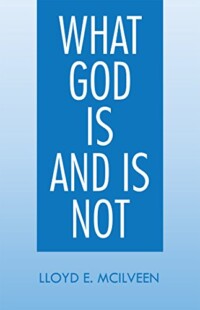Title: What God Is and Is Not
Author: Lloyd E. McIlveen
Publisher: Trafford Publishing
ISBN: 149070762X
Pages: 176
Genre: Theology
Reviewed By: Dan MacIntosh
Pacific Book Review
With his book What God Is and Is Not, Lloyd E. McIlveen suggests it’s perfectly fine to believe in God, if that’s what you choose to do. It is not, however, an apologetic work. McIlveen is not out to prove God’s existence (or his non-existence, for that matter). Instead, it is primarily an exploration of spiritual faith, including its history and current thought on the subject, for the reader’s contemplative consideration.
Therefore, if you’re having some sort of crises of faith, and looking for advice about who to believe in and why to believe any particular way, this is probably not the best book for you. Although McIlveen doesn’t write about particularly right or wrong ways to be spiritual, he does nevertheless extol the virtue of remaining openminded. Even if you’re an atheist, he seems to suggest, it’s likely in your best interest to remain open to the possibility that a god exists.
As you may have already guessed, this short – but deep – book is no self-help work. Instead, McIlveen is a thinker and philosopher, so his aim is to prompt readers to think as deeply has he does. And there is a freshness to McIlveen’s approach, too. You never get the impression he’s recycling ideas that have already been explored for years and years. These thoughts are, as far as we can tell, his original ideas. He’s obviously given these concepts a lot of consideration, and this book is his way of letting others know what’s on his mind and what he’s discovered along his journey.
Although he doesn’t ‘put down’ organized religion, he does say that most people believe their church’s theology because it’s what they were taught/told to believe. He suggests all should think for themselves – even if this means questioning the doctrines their childhood church taught them. He also suggests that scriptures – such as The Bible – are the opinions of mere men and can’t be fully trusted. This self-taught approach probably works better for McIlveen because he’s already read well and has a large personal knowledge base to draw from. It’s doubtful, though, that many others can apply such a fast amount of knowledge to their spiritual quest.
Agree or disagree with McIlveen, it’s difficult to find fault with the logic applied throughout this book. However, one might have one small qualm with the way McIlveen defines the term ‘spirit.’ McIlveen’s definition leads the reader to believe that spirit is usually little more than a synonym for enthusiasm. He also compares it to the soul, which is the nonphysical part of a person that is the seat of emotions and character (according to one definition). Nevertheless, he gives more weight to the idea that spirit is usually little more than a strong gusto for life. One is left wishing McIlveen had spent more time considering whether or not humans have souls.
The concept of the soul is oftentimes linked to life after death and eternity – existing somewhere after the body dies. McIlveen posits that humans don’t have the capacity to comprehend eternal life. He makes a good point; nobody we know has lived forever. With that said, this contention leads the reader to the conclusion McIlveen doesn’t believe in eternal life. Or if he does, like the rest of us, he can’t ever fully understand it.
What God Is and Is Not will most likely leave you with more questions than answers. One supposes this would make McIlveen happy. As the ancient philosophers taught us, an unexamined life is not worth living. McIlveen certainly proves he believes in this time-tested principle. Everyone has an opinion about God, and McIlveen merely wants everybody to at least have an informed perspective on God.



Follow Us